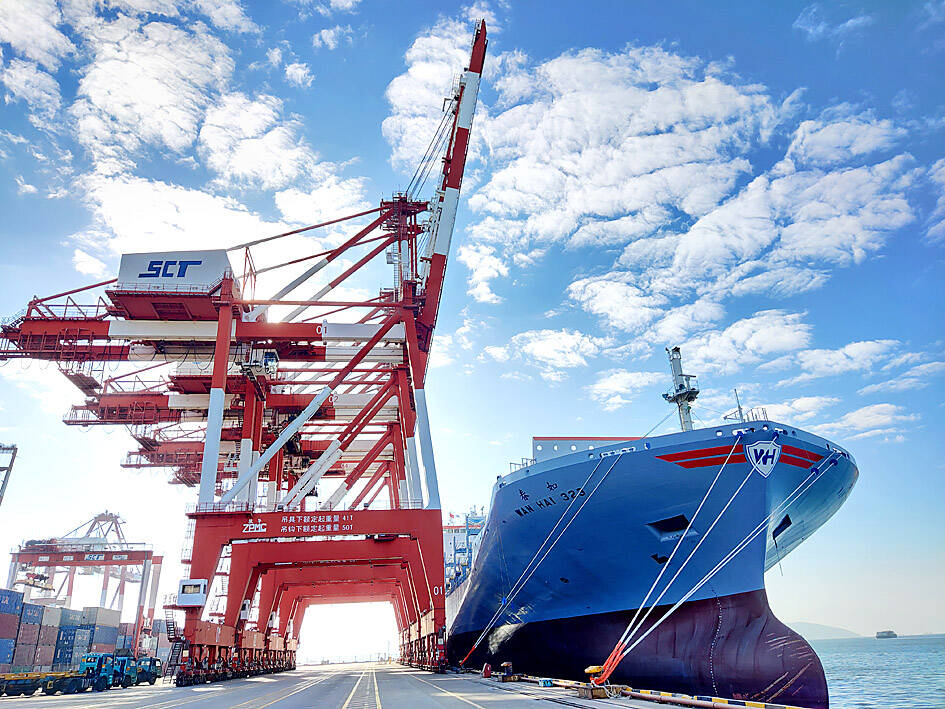Recent increases in shipping freight rates linked to the Red Sea crisis would provide a short-term boost in profit for Taiwanese container shipping firms, but the windfall is not expected to last nor end a shipping glut, Taiwan Ratings Corp (中華信評) said yesterday.
Freight rates have risen due to a bottleneck caused by rerouting to avoid attacks by Yemen-based Houthi rebels since the end of last year, the local arm of S&P Global Ratings said.
NEAR-TERM WINDFALL

Photo courtesy of Wan Hai Lines Ltd
“The increases provide a near-term windfall for Taiwanese container carriers,” said Susan Chen (陳宛暄), a corporate analyst at Taiwan Ratings whose clients include Wan Hai Lines Ltd (萬海) and Yang Ming Marine Transport Corp (陽明).
Like their global peers, Wan Hai and Yang Ming have rerouted their Europe, Mediterranean and US east coast ships around the Cape of Good Hope to avoid attacks, but the journey is a much longer one.
Although this would shore up container carriers’ bottom lines in the short term, it is unlikely to mute the impact of the industry’s overcapacity once operating conditions in the Red Sea return to normal, Chen said.
Both companies have become more flexible about their vessel scheduling and have made timely route changes to avoid service disruptions, which have driven up freight rates, she said.
However, the freight rate hikes are unlikely to match previous peaks, as the bottleneck is unlikely to persist and a supply glut is expected to last until the end of this year, the analyst said.
Total container shipping capacity would grow 7 to 9 percent this year, whereas demand would grow 2 to 4 percent, Taiwan Ratings said, adding that freight rates could drop in the second half of this year if there are no other major disruptions.
Demand for tangible goods has been weak amid a global economic slowdown, and there is a relative balance between supply and demand for goods and services compared with the COVID-19 years, Taiwan Ratings said.
That explained why shipping companies’ earnings took a dive last year after freight rates normalized, Chen said.
MARGIN PRESSURE
Wan Hai’s earnings before interest, taxes, depreciation and amortization (EBITDA) margin might recover to 15 to17 percent this year, from 11 to 13 percent last year, due to more balanced supply and demand conditions on intra-Asia routes, it said.
However, the company’s transpacific services could weigh on its margin due to its relative weak pricing power in this area, Taiwan Ratings said.
Yang Ming’s EBITDA margin would remain largely flat at 14 to 16 percent this year owing to more serious overcapacity on long-haul service lines, which underpin more than 70 percent of its total revenue, it said.
Despite pressures on profitability, both companies should maintain positive cash positions due to high cash balances from robust operations in 2021 and 2022, it said.

Intel Corp chief executive officer Lip-Bu Tan (陳立武) is expected to meet with Taiwanese suppliers next month in conjunction with the opening of the Computex Taipei trade show, supply chain sources said on Monday. The visit, the first for Tan to Taiwan since assuming his new post last month, would be aimed at enhancing Intel’s ties with suppliers in Taiwan as he attempts to help turn around the struggling US chipmaker, the sources said. Tan is to hold a banquet to celebrate Intel’s 40-year presence in Taiwan before Computex opens on May 20 and invite dozens of Taiwanese suppliers to exchange views

Application-specific integrated circuit designer Faraday Technology Corp (智原) yesterday said that although revenue this quarter would decline 30 percent from last quarter, it retained its full-year forecast of revenue growth of 100 percent. The company attributed the quarterly drop to a slowdown in customers’ production of chips using Faraday’s advanced packaging technology. The company is still confident about its revenue growth this year, given its strong “design-win” — or the projects it won to help customers design their chips, Faraday president Steve Wang (王國雍) told an online earnings conference. “The design-win this year is better than we expected. We believe we will win

Chizuko Kimura has become the first female sushi chef in the world to win a Michelin star, fulfilling a promise she made to her dying husband to continue his legacy. The 54-year-old Japanese chef regained the Michelin star her late husband, Shunei Kimura, won three years ago for their Sushi Shunei restaurant in Paris. For Shunei Kimura, the star was a dream come true. However, the joy was short-lived. He died from cancer just three months later in June 2022. He was 65. The following year, the restaurant in the heart of Montmartre lost its star rating. Chizuko Kimura insisted that the new star is still down

While China’s leaders use their economic and political might to fight US President Donald Trump’s trade war “to the end,” its army of social media soldiers are embarking on a more humorous campaign online. Trump’s tariff blitz has seen Washington and Beijing impose eye-watering duties on imports from the other, fanning a standoff between the economic superpowers that has sparked global recession fears and sent markets into a tailspin. Trump says his policy is a response to years of being “ripped off” by other countries and aims to bring manufacturing to the US, forcing companies to employ US workers. However, China’s online warriors